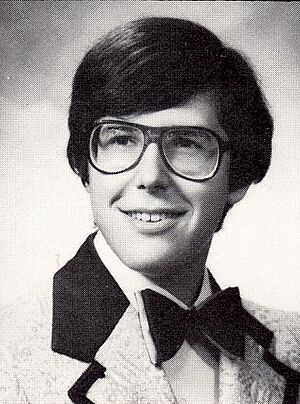Ira Glass facts for kids
Quick facts for kids
Ira Glass
|
|
|---|---|

Glass at the 2025 Tribeca Festival
|
|
| Born |
Ira Jeffrey Glass
March 3, 1959 |
| Education | Northwestern University Brown University (BA) |
| Occupation |
|
| Years active | 1978–present |
| Spouse(s) |
Anaheed Alani
(m. 2005; div. 2018) |
Ira Jeffrey Glass (born March 3, 1959) is a well-known American public radio personality. He is famous for being the host and producer of the popular radio and television show This American Life. He has also worked on other NPR programs like Morning Edition and All Things Considered. Ira Glass has won many awards for his work, including the Edward R. Murrow Award and the George Polk Award.
Ira Glass started working in radio when he was a teenager in Baltimore. He worked at NPR during his summer breaks while attending college. For many years, he was a story editor and interviewer. Later, he began to create his own stories. After moving to Chicago, he helped create This American Life with Torey Malatia. This show quickly became very popular and won a Peabody Award soon after it started. It even became a TV show on Showtime for two seasons. Ira Glass also performs live shows and has written books and a comic book related to his radio show.
Contents
Early Life and Education
Ira Glass was born in Baltimore, Maryland, on March 3, 1959. His parents were Barry and Shirley Glass. He grew up with two sisters. His father was a businessman, and his mother was a clinical psychologist who studied relationships.
When Ira was a child, he dreamed of becoming an astronaut. His parents hoped he would become a doctor. He loved comedy from a young age. By the time he was 11, he and his sister would put on shows in their basement for neighborhood kids. As a teenager, he even performed as a magician.
Ira Glass went to Milford Mill High School in Baltimore County. He was involved in the school's yearbook and was co-editor of the student literary magazine. ..... He has said that his style of journalism is influenced by the musicals he enjoyed, especially Fiddler on the Roof. He was also part of student government and made the school's morning announcements. In high school, he wrote jokes for a local radio DJ.
After high school, Ira Glass went to Northwestern University in Evanston, Illinois. He first planned to study medicine. He spent a lot of time at the university's radio station, making promos. He later transferred to Brown University, where he studied semiotics, which is the study of signs and symbols. He graduated in 1982.
Career in Radio
Starting in Radio
After his first year of college, 19-year-old Ira Glass looked for work in television, radio, and advertising in Baltimore. He found an unpaid internship at National Public Radio (NPR) headquarters in Washington, DC. He started by editing promotional announcements and then became a production assistant. He decided to stay with NPR and not pursue medicine, which surprised his parents.
Ira Glass worked at NPR for 17 years. He became a reporter and host for several NPR programs, including Morning Edition, All Things Considered, and Talk of the Nation. He learned a lot from working with other radio producers. He said that editing for Noah Adams taught him how to step back from a story and add bigger ideas, a technique he still uses today. When he was almost 30, he tried reporting his own stories. He felt he wasn't very good at it at first.
In 1989, Glass moved to Chicago. He continued to produce reports for NPR's All Things Considered. He said that a story he did on the 75th anniversary of Oreo cookies taught him how to write well for radio. Soon after, he and Gary Covino created and co-hosted a Friday-night radio show called The Wild Room on WBEZ Chicago Public Radio. This show had a fun, relaxed style and started in November 1990. They spent two years reporting on the Chicago Public Schools. Their research showed that smaller class sizes helped students in inner-city schools.
Ira Glass eventually wanted to try something new. He started sending ideas for new shows to the Corporation for Public Broadcasting.
This American Life
In 1995, the MacArthur Foundation offered money to Chicago Public Radio to create a show featuring local writers and artists. Torey Malatia, the general manager, asked Ira Glass for ideas. Glass suggested a weekly show with a different approach and a larger budget, hoping to make it a national program. He took two months off to work on the pilot episode.
The main idea for the show was to tell stories about everyday people and things that weren't usually in the news. These real-life stories would be mixed with works from journalists, writers, or performers. Ira Glass invited David Sedaris to read his essays on the program, which helped Sedaris become a successful author. The show, first called Your Radio Playhouse, aired on November 17, 1995. The first episode was called "New Beginnings." It included interviews and stories by different artists. The show's name changed to This American Life on March 21, 1996. It became available to radio stations across the country in June 1996.
Ira Glass worked very hard on the show, spending 70 to 80 hours a week in the offices. The show quickly became very popular and is often seen as changing how journalistic radio is done in the U.S. It won a Peabody Award within six months of its first broadcast. Over time, the show started to include more reporting in a storytelling style, like its coverage of victims of Hurricane Katrina. Famous guest contributors included Dave Eggers and Sarah Vowell. On November 17, 2005, This American Life celebrated its tenth anniversary.
The TV network Showtime wanted to turn This American Life into a television program. The team first said no because they didn't want to change the show's style. But they agreed after Showtime promised to keep the unique format. The first half-hour TV episode aired on March 22, 2007. The show ran for thirteen episodes over two seasons, ending in 2009 because it was a lot of work to produce.
In 2014, Chicago Public Media started distributing This American Life themselves. By 2020, This American Life reached over 4.7 million listeners every week. Ira Glass has been heard in almost every episode. In July 2013, the 500th episode was released.
In May 2009, a This American Life radio episode was broadcast live to over 300 movie theaters.
Other Projects
Besides radio, Ira Glass has also worked as a writer. In September 1999, he worked with Jessica Abel on a comic book called Radio: An Illustrated Guide. This book explains how This American Life is made and teaches readers how to create their own radio program. In October 2007, he published a collection of writings called The New Kings of Nonfiction.
Ira Glass has also worked on several movies. In 2006, he was an executive producer for the movie Unaccompanied Minors. This film is based on a true story from a This American Life editor. In 2007, he co-wrote a screenplay based on a book about a man choosing between his friends and his girlfriend. Glass also produced the 2018 Netflix movie Come Sunday.
Glass often works with comedian Mike Birbiglia. In 2012, Glass co-wrote and produced Birbiglia's film Sleepwalk with Me. They toured together to promote the movie. Glass was also a co-producer for Birbiglia's 2016 film Don't Think Twice and his 2018 Broadway show The New One.
In 2013, Glass worked with Monica Bill Barnes & Company to create a show called Three Acts, Two Dancers, One Radio Host.
In 2019, Glass went on tour with a show called Seven Things I've Learned. In this show, he talks about how to tell a good story. Dancers from Monica Bill Barnes & Company also performed in the show.
Tours
- This American Life — Live! (2009)
- Three Acts, Two Dancers, One Radio Host (2013–2017)
- Seven Things I've Learned (2019)
Books
- Radio: An Illustrated Guide (1999)—written with Jessica Abel
- The New Kings of Nonfiction (2007)
Appearances
Ira Glass has appeared on several late-night television shows, including Late Show With David Letterman and The Colbert Report.
In 2004, he participated in a storytelling event called Visible and Invisible Drawings: An Evening With Chris Ware and Ira Glass. In February 2005, Glass presented Lies and Sissies and Fiascoes, Oh, My! in New Orleans.
Glass has been a guest on many podcasts, such as TBTL and Freakonomics. In 2011, he appeared on The Adam Carolla Podcast. He also guest co-hosted Dan Savage's podcast, "Savage Love," in 2012. In 2022, Glass's interview with Debbie Millman was featured on the Storybound podcast.
On May 18, 2012, Ira Glass gave the graduation speech at Goucher College in Baltimore. He also received an honorary degree. Glass was one of the voice artists for the audiobook "Suddenly, a Knock on the Door: Stories."
Glass also lent his voice to The Simpsons in the episode "Elementary School Musical." He appeared in the film We Cause Scenes (2013) and as himself in the 2014 movie Veronica Mars. In 2018, Glass made a small appearance in the film Ocean's 8. In 2019, he appeared as himself in an episode of the TV show Proven Innocent. In 2020, he appeared in the TV show High Maintenance.
Personal Life
For a time, Ira Glass dated cartoonist and author Lynda Barry. She moved to Chicago in 1989, and Glass followed her.
Ira Glass married Anaheed Alani, a writer and editor, in August 2005. They separated in March 2017 and later divorced.
His older sister, Randi Glass Murray, is a literary agent. His younger sister, Karen Glass Barry, worked in film development at Disney Studios. He is a distant cousin of the famous composer Philip Glass, who has appeared on Ira's show.
Ira Glass has supported Prison Performing Arts and dedicated an episode of This American Life to one of their plays. He became a vegetarian after visiting a chicken sanctuary.
Ira Glass enjoys TV shows like Gilmore Girls and Family Guy. .....
Beliefs
Ira Glass has said on This American Life that he is an atheist. He explained that he feels connected to his Jewish cultural heritage, but he doesn't believe in a God. He thinks that people created stories to make sense of the world. He has also said that Christians are often shown unfairly in the media, and that the Christians he knows are "incredibly wonderful and thoughtful."
Awards and Recognition
Ira Glass received the Edward R. Murrow Award for Outstanding Contributions to Public Radio in 2009. In 2011, he won the George Polk Award in Radio Reporting for an episode called "Very Tough Love". This report showed very strict punishments given by a judge in Georgia. The episode led to the judge stepping down from her position.
In 2012, Glass received an honorary degree from Goucher College. In May 2013, he received the Medal for Spoken Language from the American Academy of Arts and Letters. He was part of the team that won the Gold Award for best documentary from the Third Coast International Audio Festival in 2013 for Harper High School. He was also added to the National Radio Hall of Fame in November 2014.
In 2020, Ira Glass and the This American Life staff won the first-ever Pulitzer Prize for Audio Reporting. They won for their episode "The Out Crowd," which shared personal stories about the "Remain in Mexico" policy.
Images for kids
 | Tommie Smith |
 | Simone Manuel |
 | Shani Davis |
 | Simone Biles |
 | Alice Coachman |








